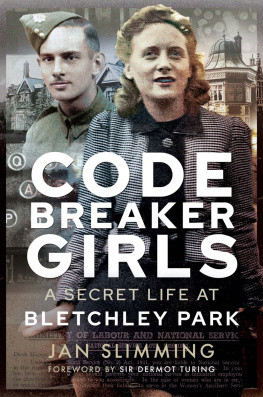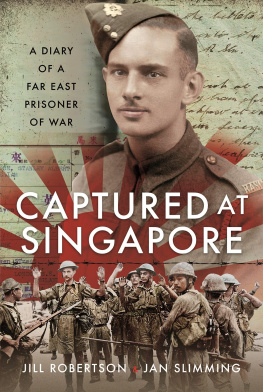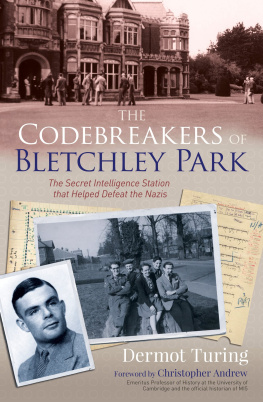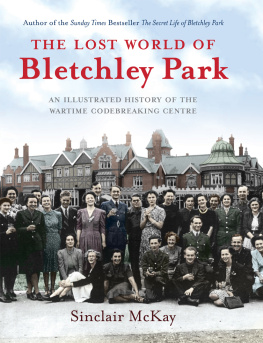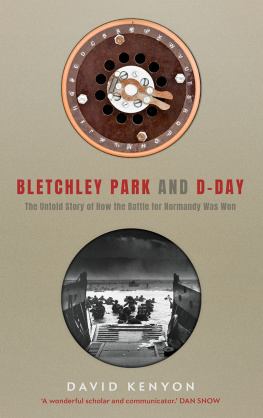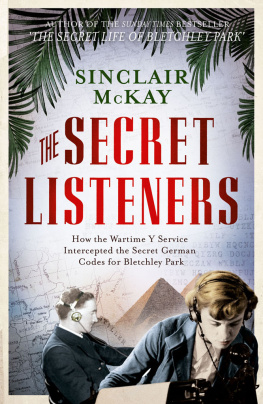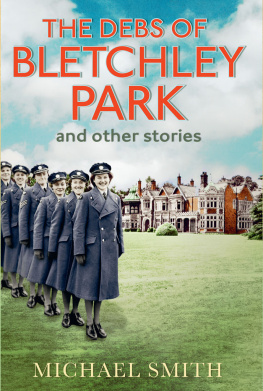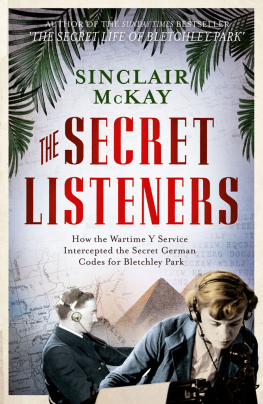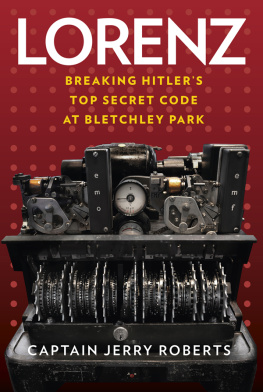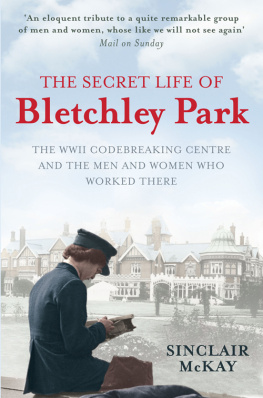
CODEBREAKER
GIRLS
To my parents, the Silent Generation of the Second World War, their families and all future generations.
What would it be like to keep a secret for fifty years; never tell your parents or your children; never even tell your husband?
Steve Goss, WABE, NPR, Atlanta,
November 2012
I had to work out what was different it was all gibberish to me.
Daisy Evelyn Lawrence, London,
July 2005
CODEBREAKER
GIRLS
A SECRET LIFE AT BLETCHLEY PARK
WITH A FOREWORD BY SIR DERMOT TURING
JAN SLIMMING
First published in Great Britain in 2021 by
PEN AND SWORD MILITARY
An imprint of
Pen & Sword Books Ltd
Yorkshire Philadelphia
Copyright Jan Slimming, 2021
ISBN 978 1 52678 411 7
ePUB ISBN 978 1 5267 8412 4
Mobi ISBN 978 1 5267 8413 1
The right of Jan Slimming to be identified as the Author of this work has been asserted by her in accordance with the Copyright, Designs and Patents Act 1988.
A CIP catalogue record for this book is available from the British Library.
All rights reserved. No part of this book may be reproduced or transmitted in any form or by any means, electronic or mechanical including photocopying, recording or by any information storage and retrieval system, without permission from the Publisher in writing.
Pen & Sword Books Ltd incorporates the Imprints of Pen & Sword Archaeology, Atlas, Aviation, Battleground, Discovery, Family History, History, Maritime, Military, Naval, Politics, Railways, Select, Transport, True Crime, Fiction, Frontline Books, Leo Cooper, Praetorian Press, Seaforth Publishing, Wharncliffe and White Owl.
For a complete list of Pen & Sword titles please contact
PEN & SWORD BOOKS LIMITED
47 Church Street, Barnsley, South Yorkshire, S70 2AS, England
E-mail:
Website: www.pen-and-sword.co.uk
or
PEN AND SWORD BOOKS
1950 Lawrence Rd, Havertown, PA 19083, USA
E-mail:
Website: www.penandswordbooks.com
Foreword
by Sir John Dermot Turing
Since the news first broke in the mid-1970s, the once-secret story of Bletchley Park and its astonishing achievements which assisted the Allied victory in World War II has become well known. More recently, authors have focused on the people who worked there, and in particular the women who largely worked in mundane but equally vital roles alongside the supposedly more glamorous codebreakers. In 1945, more than three-quarters of the Bletchley Park staff were women. What, until now, has been less clear, is that there was an immense variety of roles which women could carry out at Bletchley Park: by no means were they all WRNS operating Bombe machines. Codebreaker Girls: A Secret Life at Bletchley Park looks at the diverse roles of the women at Bletchley, while providing proper context and a wealth of incidental and interesting detail which emphasises the trying conditions of the war.
What makes Codebreaker Girls special, though, is the personal element. The principal character is Daisy Lawrence, and it is through her eyes that we see Bletchley Park. This approach, richly coloured with Daisys own archival material, allows us to see directly what the experience of a young woman at Bletchley was like. And, tellingly, it allows us a glimpse at the hidden tensions created by the contrasting war stories of Daisy and her fianc Stan. Jan Slimming writes with a clear and engaging style. It is a commendable book: enjoy it.
Prologue
Ill be back in an hour. Her supervisors voice reverberated around the cavernous room as the door slammed. Right you are, said Daisy.
A warm summer breeze wafted through the open window as she gave her usual response. The echoing words trailed off in the ensuing silence as she turned to the task in hand. This was one of those solitary shifts. Her wooden desk and chair were of wartime utility type, comfort was considered unnecessary. She began to remove the secret message slips from the special tube and as she did the delicate paper crackled.
Her supervisor would return in an hour; she was always punctual. Daisy was aware of the urgency and importance of her job even though she was just one small link in a long chain of people working toward victory. They had to win this war. She had been at Bletchley Park for eighteen months, but the war had dragged on for five years; German U-boat attacks in the Atlantic, aerial bombings, Japanese attacks on British and American soil, huge loss of life. It had to stop. At first, she hadnt realised how crucial her role was, as she and many others secretly worked together to outwit the enemy. She also needed to find her fianc, believed captured by the Japanese.
Daisy knew she was looking at intercepted enemy messages. Some came via teleprinter, others by dispatch rider. Her long slim fingers carefully unrolled the several strips of paper to reveal foot-long lines of typed letters on the desk in front of her. Sometimes the messages were numeric. Today was the usual concoction of gobbledygook letters that made no sense whatsoever. She stared at the blackish type on the yellowing paper. It was her job to analyse the secret quarry; look for errors, divide letters into groups of five, mark with a pencil. The second and third strips lay parallel to the others but still did not provide an obvious solution to the puzzle. She tried to pick out letter patterns; read between the lines, identify unusual features.
The fourth strip proved more fruitful as a pattern began to appear. This time it was the double letter P. She continued to set out more strips until the tube was empty. She confirmed her analysis and would pass the information on to her supervisor. Sometimes she indexed the information on various cards and filed them into small boxes. Other times she used the overhead conveyor to relay the messages. The vacuum-operated contraption pierced the calm of her empty room, with its weird cranking and whooshing noises, as secret messages rattled overhead to another office. Her supervisor would be pleased with this batch. She was not to speak about her work to anyone except other decoders. It was Work of National Importance. She must work with diligence and speed.
The messages Daisy Lawrence handled originated from Axis powers. Enciphered by special machines, they were part of the enemys larger plan. British, American or other Allied coastal listening stations had intercepted the messages and swiftly sent them via teleprinter, wireless communications or motorcycle in a secured tube to Bletchley Park. This is her Second World War story, and beyond.
Introduction
Daisy Lawrence was my mother.
I was six the first time she told me about Bletchley Park;
we went there, Mum, Dad, Jill and I
but it would be four decades later before I returned.
London 2006
Whats that? Neither of us had seen the small bundle before. As Jill proceeded to remove the ribbon from the delicately tied package, we both realised we were holding our breath in anticipation of a surprise inside. We werent disappointed. The flimsy treasures revealed well preserved papers belonging to our mother: Second World War call-up papers, newspaper cuttings, correspondence from the Foreign Office, old letters and telegrams from my father, communications from other family members, pay stubs and photos.
White sharp fold lines contrasted with dark ink dust shadows. The old newspaper cuttings were so frail and crisp to touch, we were afraid they might break. Folded for six decades, yellowed with age, the documents lay hidden in her blanket box. Most faces in the photographs were unfamiliar, few were annotated. Jill, my twin, agreed to store our find until we had time to properly ponder the contents I would study them in detail on my next trip home to England. We knew the papers referred to Bletchley Park, but what was this secretive world of our mother. Who were the people she worked with? Why was she chosen?
Next page
